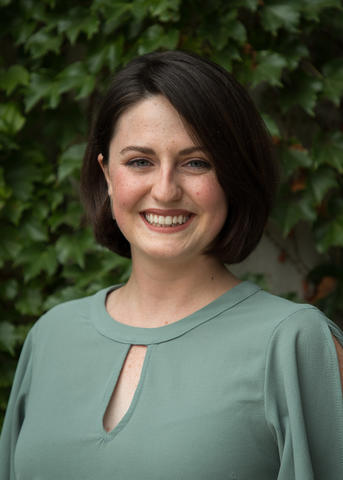
Carli Poisson
E-MAIL: [email protected]
PhD 2024
PhD Thesis:
Characterizing deep layer superior colliculus neurons and their contributions to cue learning in rats.
Undergraduate Institution and Major:
Wesleyan University, B.A. in Neuroscience and Behavior, 2018
Graduate Advisor:
Benjamin Saunders, Department of Neuroscience)
Graduate Research:
Carli is studying how sensory systems interface with dopaminergic cell populations that play a crucial role in motivation and reward.
Graduate Publications:
- Poisson CL, Engel L, Saunders BT. Dopamine circuit mechanisms of addiction-like behaviors. Front Neural Circuits. 2021 Nov 9;15:752420.
Professional Awards:
- Dean's Distinguished Fellowship Award, 2018-present
Professional Outreach:
- Community of Practice Member, Leveraging Research for Change: Selected to be a member in a group of multidisciplinary academics at different Midwest institutions who meet remotely under a common goal. This community, Leveraging Research for Change, works to develop concrete ways for academic research to positively impact communities inside and outside of academia. 2019-present
- Scientist letter writer, Letters to a Pre-Scientist: Matched with middle school student from underpriveledged schools to be pen pals. Communicates with students about their interests and demystifies what it means to be a scientist in order to foster the next generation of scientists. 2019-present
Rotations:
Julia Lemos, Ph.D., Department of Neuroscience
Anna Lee, Ph.D., Department of Pharmacology
Benjamin Hayden, Ph.D., Department of Neuroscience
Benjamin Saunders, Ph.D., Department of Neuroscience
Undergraduate or Post-Bac Research:
At Wesleyan I studied motivated behaviors, particularly addiction, under the guidance of Dr. Mike Robinson. My senior thesis utilized optogenetics to understand what role the Central Amygdala could play in the compulsive desire to take drugs in an addiction model. During the summer of 2016 I also worked with Dr. Katherine Serafine to study the connections between diet and addiction through a program funded by the NIH that brings undergraduate researchers from across the country to study the neuroscience of addiction.
Undergraduate Publications/Abstracts:
- Hernandez-Casner C, Woloshchuk CJ, Poisson CL, Hussain S, Ramos J, Serafine KM. Dietary supplementation with fish oil reverses high fat diet-induced enhanced sensitivity to the behavioral effects of quinpirole. Behav Pharmacol. 2017;28:477-484.
- Honors Thesis: The slippery slope: exploring the role of the central amygdala in creating compulsive preference. A yearlong research project in consideration for university honors. Wesleyan University, May 2018.
Undergraduate Poster Presentations:
- Ben-Ezra A., Halter E., Freeland C.M., Poisson C.L., Wang A., Ferrario C.R., Robinson M.J.F., The impact of junk- food on ‘liking’ responses to sucrose, saccharin and salt in obesity-prone and obesity-resistant rats. Society for Neuroscience, November 2017, Washington D.C.
- Poisson C.L., Robinson M.J.F., Effects of optogenetic activation of the central amygdala on learning and risky decision making. Wesleyan University, July 2017, Middletown CT.
- Ben-Ezra A., Halter E., Freeland C.M., Poisson C.L., Wang A., Ferrario C.R., Robinson M.J.F., The impact of junk- food on ‘liking’ responses to sucrose, saccharin and salt in obesity-prone and obesity-resistant rats. Society for the Study of Ingestive Behavior, July 2017, Montreal.
- Poisson C.L., Woloschuk C.J., Hernandez-Casner C., Serafine K.M., Docosahexaenoic acid as a treatment for the negative health consequences of a high fat diet. University of Texas at El Paso, July 2016, El Paso
Undergraduate Awards:
- Awarded high honors in the Neuroscience & Behavior department for senior thesis.
- Phi Beta Kappa inductee on May 2018.
- Awarded Best Poster of the natural sciences at an undergraduate research symposium at the University of Texas El Paso.
What Got You Interested In Research?
I’ve always been curious about why people are motivated to do certain behaviors, especially behaviors that are harmful, and how emotions play a role in these processes. I got into addiction research because of the opioid crisis that hit my home state of Maine. Neuroscience allows me to study the biology and chemistry of motivated behaviors and how they go awry in diseases like addiction. In this way I can help my community by doing what I love: being curious and exploring the brain.
Why Did You Choose MN?
I chose Minnesota because of three reasons: the research, the people, and the Twin Cities. The Addiction Medical Discovery Team has brought a lot of talented researchers to the U and builds on the impressive addiction research that was already here. Secondly, the grad students I met during the recruitment weekend were really genuine. They all seemed like they wanted the best for us no matter where we ended up going. The weekend was also really professional and thoughtful; every detail seemed taken care of (shout out to John and Elaine!). Finally, I really loved the Twin Cities. This is my first time living in a city, and I’m struck by how beautiful and affordable it can be to live here. Plus, the music scene is fantastic.
Student Mentor and the Best Advice They Gave:
Margot DeBaker is my mentor and gave me the really good advice to put effort into becoming friends with the people of our cohort; we are going to need each other through all of this!
Favorite Itasca Memory:
My favorite Itasca memory is of building a fire outside one night with s'mores and looking at the moon through Dakota’s telescope.
